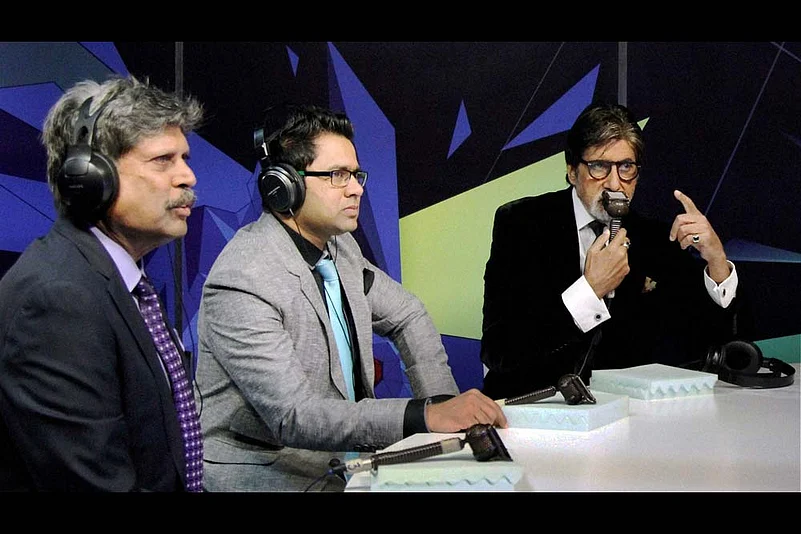Cricket Cliches
- That was a regulation catch, it should have been taken
- Remember, catches win matches
- It doesn’t matter how they come, they all count at this stage
- He is a very powerful hitter of the ball
- It has been a cracker of a game
- They have stolen defeat from the mouth of victory
- He has the safest pair of hands
- That’s a bread-and-butter shot
- They will now have to put on their thinking caps
- I have a feeling this game will go down to the wire
- “That’s good thinking”—when a batsman takes a single after hitting a six
- “He bowls wicket-to-wicket”—this to a bowler who doesn’t have either pace or turn
- The next 10 overs will decide this match.
- If this partnership stays for another 10 overs, they have a good chance
- He’s taken the aerial route
- This is a pressure cooker situation
- The opposition is trying to put psychological pressure
***
Short-format cricket is mutating fast. Already this World Cup is developing contours distinctly different from anything seen before. A.B. de Villiers alone needs a book to himself. New strokes have been added to the game, new strategies abound, new techniques are adapted. But the minds of those who provide the words to the pictures beaming to millions of homes have, sadly, remained static. Television commentary lives smugly in the land of the obvious and the banal: batsmen are still taking the aerial route, spinners continue to bowl in the right areas, fielders cannot afford to drop a catch at this level.
The grammar and language of one-day cricket are changing—but you wouldn’t know that from our commentators. We have world-class players, officials who run the world game, a captain who is defending a title won four years ago. But our commentators—whether live or in the studios—give little joy. They are bank clerks who have strayed into a poetry convention by mistake. Rahul Dravid and Sourav Ganguly are probably still the best, but even they are forced to lower their sights like Bollywood directors compelled to overexplain.
Perhaps Bollywood explains best our love for the cliche, the platitude and our suspicion of anything that sounds vaguely insightful. There is comfort in the known, and when you hear that India’s chances while chasing depend on their getting off to a good start, you feel in touch with profundity. All game situations are reduced to a handful of cliches—and the viewer can easily match one with the other. The humour, if any, has to be low-brow (Navjot Sidhu was the Johnny Lever of commentators not so long ago). It’s a vicious cycle. Commentators use meaningless expressions which are picked up by players who use them in the mistaken belief that they sound modern. Then they become commentators themselves and believe that bowling in the right areas is a cricketing term for something technical and exotic.
What of the inane discussions in the studios? Pundits tell us that the batsmen played every ball on merit or the bowlers need to take early wickets and make other such stunningly original observations. Amitabh Bachchan in the studio before an India-Pakistan match might be a marketing coup (not for the channel but for his latest movie), but in trying to fit in with a chatty, chummy, insider group, he failed. With the current obsession with former players (however awful they might sound on TV), there is no room for the intelligent outsider.
Do the likes of Nikhil Chopra or Atul Wassan add to our understanding of the game, or are they around to nod in agreement with the anchors’ agenda? Some of the game’s finest thinkers in India didn’t play Tests. But they are students of the game. What are the chances of an idiosyncratic, opinionated, language-loving commentator breaking through? A Boycott or a David Lloyd even? They are stymied by the first law of Indian broadcasting: be serious, that’s your job.
The build-up to that Pakistan game saw some of the worst of Indian TV. The hook-up with a channel in Pakistan and the general air of anger and accusations was amateurish. Patriotism sells, but an overdone, plastic version of it is vomit-inducing. When news anchors scream a not-so-subtle version of “We will thrash you”, they sound like Muhammad Ali trying to put “bums on seats” before one of his fights. It is also a reminder of sport’s ability to take the shape of whatever philosophy is poured into it. Shrieking is no substitute for analysis, but perhaps some of our TV channels have primed their audiences into believing that he who shouts loudest wins the argument. The best in the world—Nasser Hussain, Mike Atherton, Mike Holding, Tony Cozier, Ian Chappell—bring to their comments an expertise and turn of phrase not found in the ‘Book of Cliches for All Occasions’. They have a lightness of touch, which Indian commentators lack.
There are hierarchies of ineptitude in cricket commentary. At one end of the scale is the hackneyed. At the other is the exclusive boys club favoured by Channel Nine, full of insider jokes, and the “sound of people who know each other too well and thus exclude the viewer”, as cricket writer Geoff Lemon put it. Somewhere between the buffoonery of Channel Nine and the banality of our own lies the balance.
Television—especially during a World Cup–is often the introduction to the sport for a whole generation. Cricket is a complex game, the patterns are not always immediately apparent. This is where the commentator comes in, explaining, anticipating, reading the minds of the captains, connecting dots, pointing to similar patterns from the past. It’s not enough to say when a Virat Kohli plays a cover drive that “India need him to play a long innings”. No event in cricket is an island, entire of itself. Everything is part of the main, a piece of a larger picture. Commentators must paint this larger picture. But they prefer instead to tell us that “the next 10 overs will decide the match” or something equally banal.
Cricket lends itself to humour, the light touch. Only the truly passionate understand it is a trivial pursuit. Yet, our commentators give the impression that they are involved in some earth-shattering, life-altering pursuit. It was said of John Arlott, the greatest (radio) commentator of them all, that he never made the mistake of assuming the game was greater than life. If cricket is fun, then why don’t the commentators indicate that? We understand it is a pressure cooker situation, and striking clean as a whistle (the pressure cooker whistle, presumably) is what is called for, but shouldn’t somebody bat through and convey to us with intelligence and passion the joy of watching a cricket match?


























